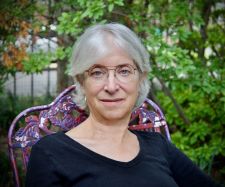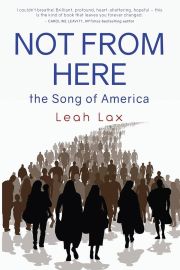Regarding the structure of the book, Lax explains, “It opens with a scene in which, there’s a preamble where I tell a little bit of how this book happened, and I beg the reader to try to hear each voice in its own accent, and picture each person in their own shape and color because this is the great quilt of America. Then, the book opens with me as a Hasidic woman sitting in the backyard with my kids and with our housekeeper who was from El Salvador, and I knew nothing about El Salvador… she says, ‘In my country, there are no birds…’ because of the guns and because people eat them for food… that’s how the book opens, and then it turns directly to the story of the El Salvadoran woman, and along the way, I do provide and expose the American involvement, the history, the context… and it goes from story to story like that… I do not group people by where they come from… I grouped them by what caused them to come… in every case, they tell their own stories, which I think is infinitely more impactful…” While Lax did interact with and talk to many people for her book, she wasn’t able to include everyone’s stories. Rather than excluding them, she featured them in the section titled “Intermezzo.” She said, “In the ‘Intermezzo’ section, it’s anywhere between 2 to 4 pages of quotes, just single quotes, sometimes a whole paragraph… and each one is someone from another part of the world, and sometimes they’re funny, and sometimes they’re quaint, and sometimes they’re shocking, and sometimes they’re just very, very moving… I wanted to give you a sense of what it’s like walking down the street in Houston if you could actually hear their stories.”

I was shocked to discover that about the first 20 people I met were here because of war. The whole first section is called, ‘We Came in the Aftermath of War.’ Each person is from a different part of the world.”
Podcast: Play in new window | Download
Subscribe: RSS




Want to join the discussion?
Feel free to contribute!